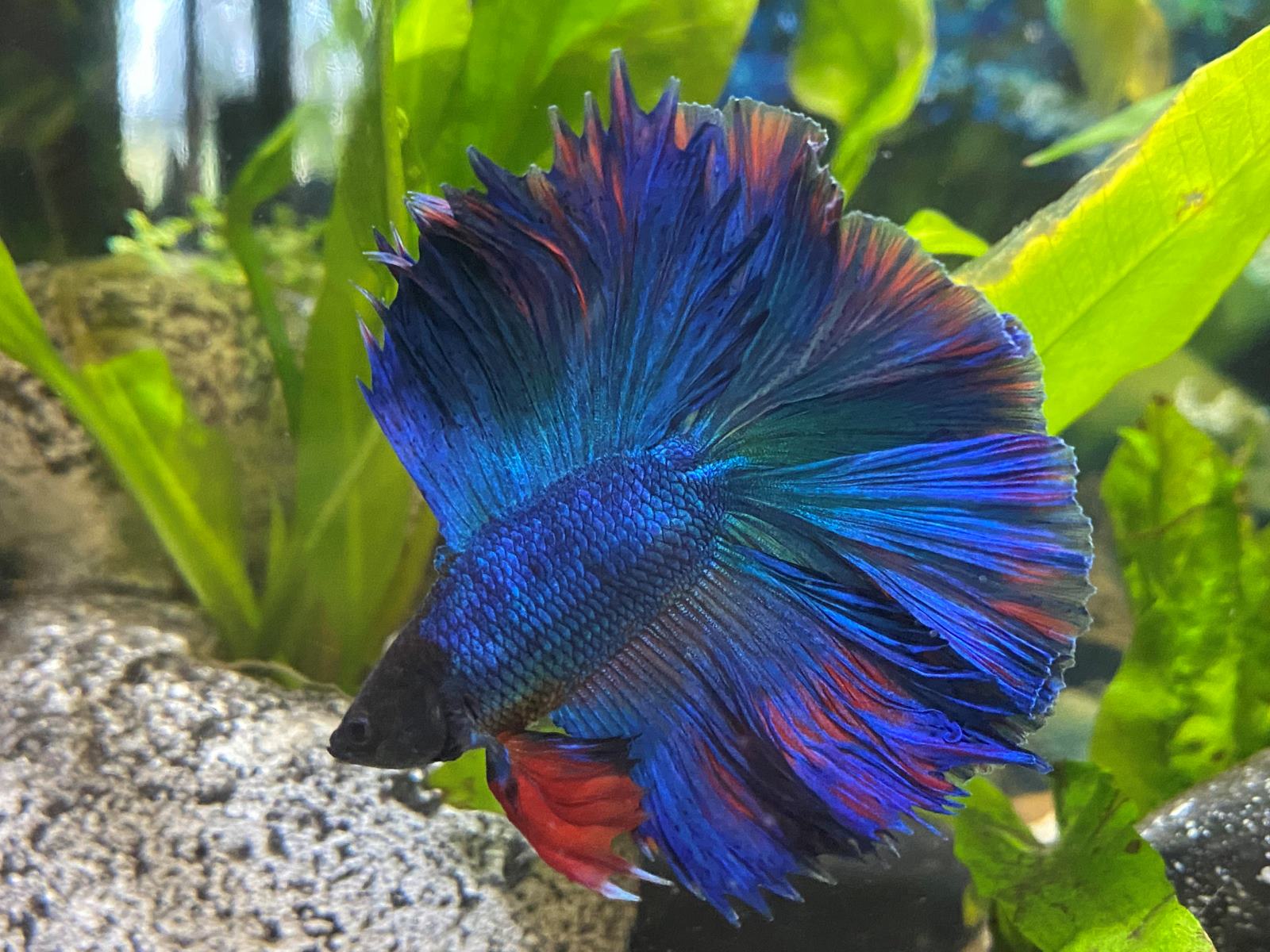Home>Pets & Animals>Betta Fish Behavior: Unusual Lethargy And Strange Gravel Obsession


Pets & Animals
Betta Fish Behavior: Unusual Lethargy And Strange Gravel Obsession
Published: January 23, 2024
Learn about unusual betta fish behavior, including lethargy and strange gravel obsession. Find expert tips for addressing these issues. Keep your pets healthy and happy.
(Many of the links in this article redirect to a specific reviewed product. Your purchase of these products through affiliate links helps to generate commission for Regretless.com, at no extra cost. Learn more)
Table of Contents
Introduction
Betta fish, also known as Siamese fighting fish, are popular aquatic pets cherished for their vibrant colors and elegant fins. These stunning creatures are renowned for their unique behaviors, which captivate the hearts of fish enthusiasts worldwide. Understanding and interpreting betta fish behavior is crucial for ensuring their well-being and happiness in captivity. From unusual lethargy to peculiar gravel obsessions, these behaviors can often leave pet owners puzzled and concerned. In this article, we will delve into the fascinating world of betta fish behavior, shedding light on the causes and potential solutions for unusual lethargy and strange gravel obsession. By gaining insight into these behaviors, pet owners can provide the best care for their beloved betta fish, fostering a harmonious and thriving aquatic environment.
Understanding Betta Fish Behavior
Betta fish, scientifically known as Betta splendens, are captivating creatures with a wide array of behaviors that are both intriguing and unique. These fish are known for their solitary nature and territorial instincts, which are essential to comprehend for their proper care and well-being in captivity.
Solitary Nature:
Betta fish are solitary creatures and are best kept alone in a tank. They are territorial and fiercely defend their space, especially the males. When two male bettas encounter each other, they engage in aggressive displays, often resulting in physical combat. This behavior is why they are also referred to as "Siamese fighting fish."
Labyrinth Organ:
One of the most fascinating aspects of betta fish behavior is their ability to breathe air from the surface due to a specialized organ called the labyrinth. This adaptation allows them to survive in oxygen-deprived waters, making them resilient and adaptable to various environmental conditions.
Colorful Displays:
Betta fish are renowned for their vibrant and iridescent colors, which they use for communication and display. Males, in particular, exhibit striking displays of their fins and colors to attract females and establish dominance within their territory.
Interactive Nature:
Despite their territorial instincts, betta fish are surprisingly interactive with their human caretakers. They can recognize their owners and may even respond to their presence by swimming to the front of the tank or performing playful behaviors. This interactive nature adds to their charm as pets and fosters a unique bond between betta fish and their owners.
Understanding these fundamental aspects of betta fish behavior is essential for creating a suitable and enriching environment for these captivating creatures. By recognizing their solitary nature, unique respiratory adaptation, colorful displays, and interactive tendencies, pet owners can provide the optimal care and habitat for their betta fish companions.
Unusual Lethargy in Betta Fish
Unusual lethargy in betta fish can be a cause for concern among pet owners. Lethargy is characterized by a lack of energy, reduced activity, and a general sense of sluggishness in these otherwise vibrant and active fish. When betta fish exhibit unusual lethargy, it may indicate an underlying health issue or environmental stress that requires prompt attention.
Lethargy in betta fish can manifest in various ways, including decreased swimming activity, prolonged periods of resting at the bottom of the tank, or a lack of interest in food. Observant pet owners may notice their betta fish appearing listless, with reduced interaction and a lack of their usual energetic behaviors.
Several factors can contribute to unusual lethargy in betta fish, ranging from water quality issues to health conditions. Poor water conditions, such as high levels of ammonia or nitrites, can stress betta fish and lead to lethargy. Additionally, inadequate water temperature, extreme pH levels, or high levels of dissolved substances can adversely affect the well-being of betta fish, causing them to become lethargic.
Furthermore, betta fish may experience lethargy due to health concerns, including bacterial or parasitic infections, fungal diseases, or internal issues. These conditions can manifest as lethargy, along with other symptoms such as loss of appetite, changes in appearance, or abnormal swimming patterns.
Environmental stressors, such as overcrowding, lack of hiding spots, or aggressive tank mates, can also contribute to lethargy in betta fish. These stressors disrupt the fish's sense of security and comfort, leading to a decline in their overall activity levels and vitality.
As responsible caretakers, it is crucial to closely monitor betta fish for signs of unusual lethargy and promptly investigate the potential causes. Maintaining pristine water quality, providing a suitable tank environment, and offering a balanced diet are essential steps in preventing lethargy in betta fish. Additionally, regular observation and swift intervention in the event of health issues can mitigate the risk of prolonged lethargy and its associated complications.
Understanding the nuances of betta fish behavior, including recognizing and addressing unusual lethargy, empowers pet owners to cultivate a nurturing and thriving environment for their beloved aquatic companions. By remaining vigilant and proactive in caring for betta fish, individuals can ensure the well-being and vitality of these captivating creatures.
Causes of Lethargy in Betta Fish
Lethargy in betta fish can stem from various underlying causes, each of which demands attention and understanding to ensure the well-being of these captivating aquatic creatures. By delving into the potential triggers of lethargy, pet owners can proactively address these issues and provide the best care for their betta fish companions.
-
Poor Water Quality: One of the primary culprits behind betta fish lethargy is poor water quality. Elevated levels of ammonia and nitrites, resulting from inadequate filtration or infrequent water changes, can stress betta fish and lead to decreased activity. Additionally, imbalanced pH levels, extreme water temperatures, and high levels of dissolved substances can adversely impact the overall health and vitality of betta fish, causing them to exhibit signs of lethargy.
-
Health Conditions: Betta fish may experience lethargy as a symptom of underlying health conditions. Bacterial infections, parasitic infestations, fungal diseases, and internal issues can manifest as lethargy, often accompanied by additional concerning symptoms such as loss of appetite, changes in appearance, or abnormal swimming patterns. Identifying and addressing these health concerns is crucial for restoring the vigor and well-being of lethargic betta fish.
-
Environmental Stressors: Environmental stressors within the betta fish tank can contribute to lethargy. Overcrowding, aggressive tank mates, lack of hiding spots, or excessive exposure to bright light can disrupt the betta fish's sense of security and comfort, leading to a decline in their activity levels. Creating a harmonious and stress-free environment within the tank is essential for mitigating the impact of these stressors on betta fish behavior.
-
Inadequate Nutrition: A diet lacking in essential nutrients can also result in lethargy among betta fish. Inadequate feeding or offering low-quality food can leave betta fish malnourished, impacting their energy levels and overall vitality. Providing a balanced and nutritious diet tailored to the dietary needs of betta fish is crucial for preventing lethargy related to nutritional deficiencies.
By recognizing and addressing these potential causes of lethargy in betta fish, pet owners can take proactive measures to safeguard the well-being of their aquatic companions. Regular monitoring of water parameters, attentive observation of betta fish behavior, and swift intervention in the face of health concerns are pivotal in creating a thriving and vibrant environment for these captivating creatures.
Strange Gravel Obsession in Betta Fish
A peculiar and often perplexing behavior observed in betta fish is their strange gravel obsession. This behavior manifests as the fish repeatedly picking up small gravel or substrate from the bottom of the tank and either carrying it around or releasing it in a seemingly purposeful manner. While this behavior may initially appear enigmatic, understanding the potential reasons behind this gravel obsession can shed light on the intricate world of betta fish behavior.
Natural Foraging Instincts
One plausible explanation for betta fish's gravel obsession is rooted in their natural foraging instincts. In the wild, betta fish scour the substrate in search of food, small invertebrates, and other edible particles. This instinctual foraging behavior is deeply ingrained in their genetic makeup, compelling them to sift through the gravel in an attempt to find sustenance, even in the controlled environment of a home aquarium.
Nest Building and Territorial Marking
Male betta fish, in particular, are known for their instinct to build bubble nests as part of their reproductive behavior. This process often involves collecting and arranging small objects, including gravel, to construct a floating nest where they may protect their eggs. The act of moving and arranging gravel within the tank could be linked to this natural nesting behavior, as male bettas instinctively prepare their territory for potential breeding activities.
Environmental Enrichment and Stimulation
Another perspective on betta fish's gravel obsession pertains to environmental enrichment and stimulation. Betta fish, like many intelligent creatures, benefit from mental stimulation and a dynamic living environment. Engaging in activities such as manipulating gravel may provide them with a form of mental enrichment, alleviating boredom and promoting their overall well-being in captivity.
Addressing Gravel Obsession
While betta fish's gravel obsession may be intriguing to observe, it is essential for pet owners to ensure that the substrate used in the tank is safe and suitable for their fish. Choosing smooth, aquarium-safe gravel or substrate minimizes the risk of injury to the fish as they engage in this behavior. Additionally, providing alternative forms of enrichment, such as live plants, floating objects, or interactive feeding methods, can offer betta fish stimulating activities while reducing their excessive focus on gravel manipulation.
Understanding and appreciating the intricacies of betta fish behavior, including their unique gravel obsession, allows pet owners to create an enriching and fulfilling environment for these captivating aquatic companions. By embracing their natural instincts and providing a safe and stimulating habitat, individuals can foster the well-being and happiness of their betta fish, celebrating the remarkable behaviors that make these creatures so captivating.
Addressing Betta Fish Behavior Issues
Addressing betta fish behavior issues is paramount for ensuring the well-being and vitality of these captivating aquatic creatures. By taking proactive measures and implementing thoughtful strategies, pet owners can create an enriching and harmonious environment that supports the natural behaviors and tendencies of betta fish.
Monitoring Water Quality
Maintaining pristine water quality is a fundamental aspect of addressing betta fish behavior issues. Regular testing for ammonia, nitrites, nitrates, and pH levels is essential to ensure a healthy aquatic habitat. Performing routine water changes and investing in a reliable filtration system are crucial steps in safeguarding the well-being of betta fish and mitigating potential stressors stemming from poor water conditions.
Providing Adequate Space and Enrichment
Offering betta fish an appropriate tank size with ample space for swimming and exploration is vital for addressing behavior issues. Additionally, incorporating environmental enrichment such as live plants, caves, and floating objects provides mental stimulation and recreational opportunities for betta fish, reducing the likelihood of stress-related behaviors and promoting their overall welfare.
Balanced Diet and Feeding Practices
Providing a balanced and nutritious diet tailored to the dietary needs of betta fish is essential for addressing behavior issues related to nutrition. Offering high-quality betta-specific food and incorporating occasional treats such as live or frozen foods enriches their diet and contributes to their overall vitality. Furthermore, establishing a consistent feeding schedule and monitoring their food intake helps maintain their health and prevents potential behavioral irregularities.
Creating a Stress-Free Environment
Minimizing environmental stressors within the betta fish tank is crucial for addressing behavior issues. This includes ensuring compatibility with tank mates, maintaining appropriate water temperature and lighting conditions, and offering sufficient hiding spots to alleviate potential stress and territorial conflicts. By creating a stress-free environment, pet owners can foster a sense of security and well-being for their betta fish companions.
Veterinary Care and Observation
Regular observation of betta fish behavior and swift intervention in the event of health concerns are pivotal for addressing behavior issues. Seeking veterinary care at the first signs of illness, abnormal behavior, or physical symptoms is essential for diagnosing and treating potential health conditions. Proactive veterinary care plays a critical role in maintaining the overall health and resilience of betta fish.
By implementing these strategies and remaining attentive to the behavioral cues of betta fish, pet owners can cultivate a thriving and enriching environment that supports the natural instincts and tendencies of these remarkable aquatic companions. Addressing behavior issues with diligence and care contributes to the well-being and happiness of betta fish, fostering a rewarding and fulfilling experience for both the fish and their caretakers.
Conclusion
In conclusion, the captivating world of betta fish behavior encompasses a myriad of fascinating traits, from their solitary nature and vibrant displays to their unique gravel obsessions and potential health challenges. Understanding and interpreting these behaviors is essential for providing the best care and environment for betta fish in captivity.
Unusual lethargy in betta fish serves as a crucial indicator of potential health issues or environmental stressors, prompting pet owners to remain vigilant and proactive in maintaining pristine water quality, observing feeding practices, and promptly addressing any signs of illness or behavioral irregularities. By recognizing the causes of lethargy and taking proactive measures, pet owners can safeguard the well-being and vitality of their betta fish companions.
The enigmatic gravel obsession observed in betta fish offers insight into their natural foraging instincts, nesting behaviors, and the need for environmental enrichment. By acknowledging and addressing this behavior, pet owners can ensure the safety of their fish while providing stimulating and engaging activities within the tank. Creating a safe and enriching habitat that caters to the innate behaviors of betta fish fosters a harmonious and fulfilling environment for these captivating aquatic creatures.
Addressing betta fish behavior issues requires a holistic approach, encompassing meticulous water quality management, environmental enrichment, balanced nutrition, stress reduction, and proactive veterinary care. By implementing these strategies, pet owners can create an environment that supports the natural instincts and tendencies of betta fish, promoting their overall well-being and happiness in captivity.
In essence, the world of betta fish behavior is a tapestry of intricate behaviors and instincts, each contributing to the unique charm and allure of these captivating aquatic companions. By embracing their natural behaviors and providing a nurturing environment, pet owners can cultivate a harmonious and thriving space for betta fish, celebrating the remarkable behaviors that make these creatures so extraordinary.











